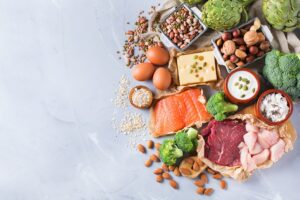
Medication can help to treat and manage cholesterol successfully. However, making lifestyle changes may have the biggest long-term benefit. If you can reach and maintain a state where medication isn’t required, you can bet you’ll feel better and likely live longer.
One of the biggest lifestyle areas affecting change in cholesterol is diet. What you eat can directly affect the amount and type of cholesterol in your bloodstream. Here are some things to think about when eating for improved cholesterol.
Reduce sugar intake: High-sugar foods, like soda, specialty coffees, candies, snacks, and other processed foods, can have a significant effect on cholesterol. These items get the body to produce LDL (bad) cholesterol that can accumulate along arterial walls.
LDL cholesterol is hard, dense cholesterol molecules that stiffen and block arteries.
Cut out trans fats: Trans fats, sometimes called “hydrogenated” or “partially hydrogenated vegetable oils” are common ingredients in margarine and things like store-bought cookies, crackers, and cakes. These products are known to boost cholesterol levels, and have been banned by the FDA since 2001.
Eat foods rich in omega-3 fatty acids: Fish like salmon, herring, and mackerel, as well as foods like walnuts and flax seeds, are rich in omega-3 fatty acids, also known as “healthy” fats. Omega-3’s may help boost “good” HDL cholesterol, which can help remove LDL from arterial walls and promote better heart health.
Increase soluble fiber intake: Getting both soluble and insoluble fiber is part of a healthy diet, but soluble fiber can help reduce the amount of cholesterol absorbed into the bloodstream.
Oatmeal, kidney beans, apples, pears, and Brussels sprouts are all good sources of soluble fiber.
Drink whey protein: Whey protein, which is found in dairy products, may be one of the main reasons dairy is so healthy. Research has suggested that whey protein supplements (protein shakes) may reduce LDL, total cholesterol, and blood pressure.